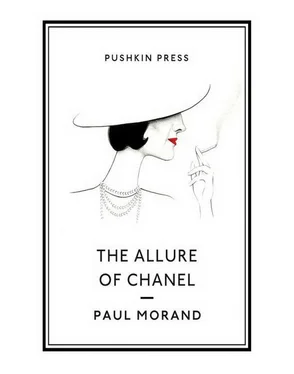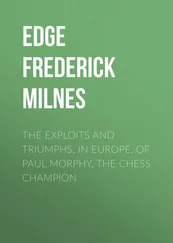Others have lived out their youth. Mine was a dream. Reality would no doubt have been better. But I thrive on solitude. I stop winning the game as soon as a gentleman comes up to me and whispers in my ear:
“May I put a thousand francs behind you?”
In that case, I know I have lost beforehand.
I hate people touching me, rather as cats do. I walk straight along the path I have plotted for myself, even when it bores me; I am its slave, because I have chosen it freely. Being as tough as steel, I have never missed a day’s work, and I’ve never been ill; I avoided various famous doctors who forecast different deadly diseases that I have failed to treat. Since the age of thirteen, I have no longer contemplated suicide.
I have made dresses. I could easily have done something else. It was an accident. I didn’t like dresses, but I liked work. I have sacrificed everything to it, even love. Work has consumed my life.
Gradually, rather than be surrounded with friends, I have found it more convenient to surround myself with regular visitors to whom I can freely say: “go away now”.
I gave my time to work alone. M A, whom I had offended, said to me one day:
“You dislike me.”
I replied:
“When did you think I had the time to do that?”
For people think of everything, they imagine every sort of hypothesis, apart from one: that one works and that one takes no notice of them.
2 Named after a celebrated nineteenth-century courtesan. [Tr]
IT WAS SHORTLY AFTER the death of Boy Capel that I made the acquaintance of the Sert household; that is to say of Misia, née Godebska, who was Polish, and José Maria Sert, who was Catalan. We were like new toys for each other … The Serts were moved to see a young woman weeping her heart out in grief. They were in Italy; they decided against going to Venice, which was their fiefdom, where I did not wish to go, altered their itinerary for me, and took me off in a motor car.
So began a close relationship which would last until Sert’s death, with all the ripples that a clash of characters as entrenched as ours can stir up. I shall try to describe, in the course of this memoir, the tortuous bends, or more precisely the zig-zags, for there were plenty of right angles, that this relationship took.
One day I went to ask St Anthony of Padua to help me to stop mourning. I can still see myself in the church, before the statue of the saint, to the left, among the fine sarcophagi of Venetian admirals. A man in front of me was resting his forehead against the stone slab; he had such a sad and beautiful face, there was so much rigidity and pain in him, and his exhausted head touched the ground with such weariness that a miracle took place within me. I’m a wretch, I told myself; how shameful! How could I dare compare my sorrow of a lost child, for whom life has scarcely begun, with someone in this distress?
An energy immediately flowed through me. I took new heart and decided to live.
“Môsieur” Sert was a personality, a character, much larger than in the painting of him. He was as munificent and immoral as a Renaissance man. He loved money, even though he was profligate. “You have to admit that Sert makes everything else seem rather drab,” Misia said to me; it was true. He was the ideal travelling companion; always good-humoured, a cicerone of weird and prodigious erudition. Each tiny bit of knowledge was balanced by another, as were his spectacular pictorial fantasies. This huge, hairy monkey, with his tinted beard, his humped back, his enormous tortoiseshell spectacles—veritable wheels—loved everything colossal. He slept in black pyjamas, never washed, and, even naked, looked as though he was wearing a fur coat, so hirsute was he; it was just as indecent. He had hair everywhere, except on his head. He guided me through museums like a faun through a familiar forest, he explained everything to my attentive ignorance, he liked to educate me, and he found in me a naturalness that he preferred to all his erudition. We would make huge detours of a hundred kilometres in search of some osteria where you could eat birds rolled in vine leaves; from Ucellos to ucelli ; Sert, who once upon a time had roamed around Italy on foot, by donkey, in every way imaginable, maintained that he remembered the place very well. He unfolded his maps. In the end, the restaurant was nowhere to be found.
“Toche” (that’s what he called Misia), “we’ve made a mistake; we should have turned right. Let’s go back!”
We got lost again. Then we bought a pig, which we took with us in the car and had roasted by the side of the road.
He was delighted by his mistakes. He revelled in the unforeseen. Very sober, and flanked by two women who ate very little, Sert, who was lavish by nature, ordered rare wines, and meals that made our table look like a painting by Veronese or Parmigiano. In his inside pocket Sert carried crumpled thousand-franc banknotes. What he did with the money has always been a mystery to me; I never saw him use it. And it was impossible to pay the tip:
“This dinner is mine, Madmachelle!” he said with his Spanish pronunciation which, through his beard, transformed the French language into an incomprehensible mish-mash.
“Don’t order anything else, I shan’t eat it, Monsieur.”
“You won’t eat it, but I shall order another three zabagliones with maraschino cherries! Whether you want it or not!”
“Jojo” knew about everything, the catalogue of Boltraffio’s paintings, the travels of Antonello da Messina, the lives of the Saints, which Dürer had engraved at the age of fourteen, the prices which the “hundred florins” with margins made of China paper had raised at the sale of the Hibbert collection, the art of backing and relining, which varnishes Annibale Caracci used; he could hold forth for hours on Tintoretto’s use of madder lacquer.
Slyly, he would put down advance payments on any object that he was passionate about and which he wanted to prevent me buying. His motor car was packed with suitcases, canvases, Capodimonte porcelain, oranges, eighteenth-century Italian illustrated books and miniature cribs.
I travelled with both the Sert households (firstly, with Misia, then, after his divorce, with Russy Mdivani); two consecutive and very different wives; but Jojo—or Maidi, a simian nickname that Russy gave him—was always a wonderful companion. Sert was not a dandy; he was not interested in gossip; he lived so that he could express a personality that his monumental, colossal, colourful rococo paintings were not entirely able to do. He only liked things on a vast scale, kilometres of frescoes, palaces that could be assaulted by a busy, frivolous paintbrush; he was very eager for commissions, extremely clever at soliciting them, and he would begin again three times, as he did at Vich, working on a cathedral whose decorations failed to satisfy him. He threw himself at life with a voraciousness that did not exclude subtlety.
We arrived in Rome, weary and drained, and we were obliged to visit the city, by moonlight, until we were exhausted. At the Colosseum, he remembered the recollections of Thomas de Quincey, and he said some wonderful things about architecture, and about the parties that might still be given among these ruins.
“I can see it decorated with balloons painted in gold, Madmachelle, something light and floating to contrast with the severity of the architecture … Architecture is the skeleton of the city. Everything is in the skeleton, Madmachelle; a face without bones doesn’t last: you, for example, Madmachelle, you would make a very beautiful corpse …”3
Sert was an enormous gnome who, inside his hump, like a magic sack, carried gold as well as rubbish, extremely poor taste and exquisite judgement, the priceless and the disgusting, diamonds and crap, kindness and sadism (Cocteau claimed that he cut off stork’s beaks), the pros and the cons (“Sert yes, Sert no,” Cocteau again used to say). Virtues and vices on a staggering scale. I remember that with Sert we used to play at “what-shall-we-buy-if-we win-the-jackpot”; and Sert, who loved the impossible, would say:
Читать дальше












